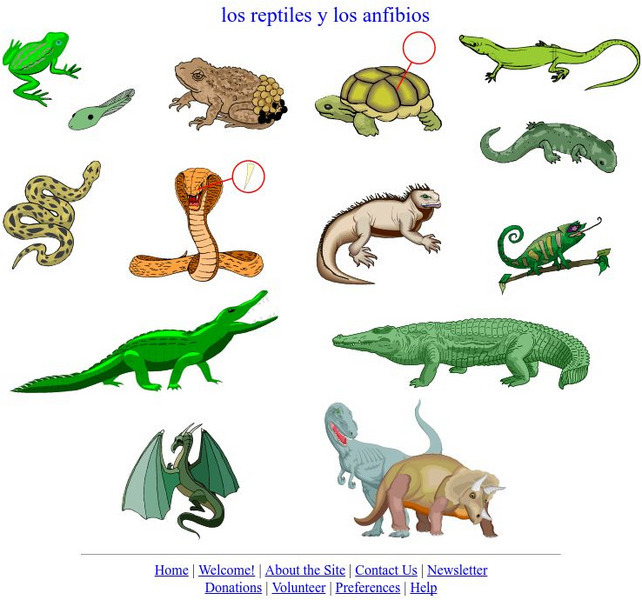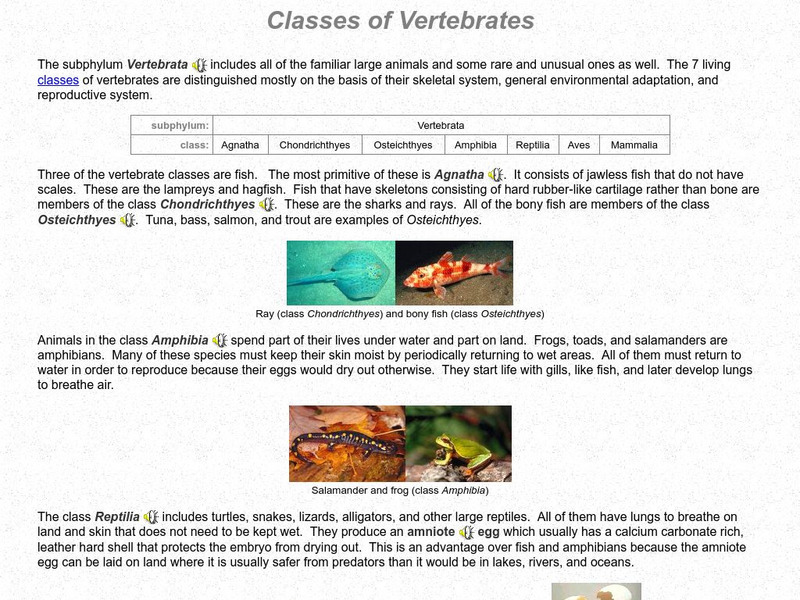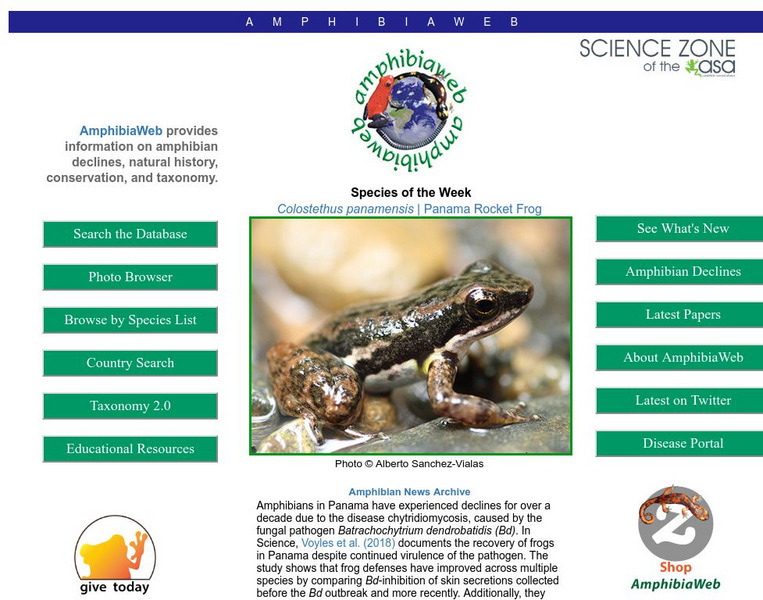Language Guide
Language Guide: Los Reptiles Y Los Anfibios
This vocabulary tutorial would integrate well with a science unit on reptiles and amphibians. Vocabulary can be seen and heard when moving the mouse over each picture.
Encyclopedia of Earth
Encyclopedia of Earth: Evolutionary Biology: Amphibian Ecology and Evolution
Information about amphibians, animals that can survive in a wide variety of habitats and cli-ates. The article discusses their behavior, diet, predators, conservation status, and evolution. (Published: August 29, 2008)
Scholastic
Scholastic News: Week of 7 21 14 : Can Frogs Fight Back?
Find out how scientists are working to increase the lifespan of frog populations that have been under attack by fungus.
Palomar Community College District
Palomar College: Class
In the animal kingdom, there are seven living classes in the phylum Vertebrata. The Palomar College shares detailed information on each of these classes. Includes examples and photos as well as a follow-up quiz.
University of California
Regents of the University of California: Amphibia Web
AmphibiaWeb, a site inspired by global amphibian declines, is an online system that allows free access to information on amphibian biology and conservation. This site is filled with amphibian facts, a glossary of terms, species numbers,...
Smithsonian Institution
Smithsonian National Zoo
Here is the National Zoological Park right at our fingertips. Students will find many things to explore at this colorful and engaging site. Any study of animals will have a successful start here. Chances are students can catch their...
Other
Science4 Us: Animals
In online and offline activities, students broaden their understanding of animals by learning to identify and classify animals into six categories: mammals, birds, fish, amphibians, reptiles, and invertebrates.
Unite for Literacy
Unite for Literacy: Mystic Aquarium: Be a Friend to Frogs!
Learn interesting facts about frogs in this book. Frogs face dangers from human activities and you will read about some things that you can do to protect them. Includes audio narration in English and Spanish with text in English.
Sea World Parks & Entertainment
Sea World: Animal Information Database
Sea World's site featuring a variety of information about their animals, as well as general animal information. Includes "Animal Bytes," a list of animals with some of their characteristics. Also includes some games and teacher resources.
University of Michigan
University of Michigan Critter Catalog: Amphibians
This site provides a general description of amphibians and then describes in detail the characteristics of local animals in southern Michigan. Pictures, classification information, and sound clips of some amphibians are provided.
National Geographic Kids
National Geographic Kids: Animals: Poison Dart Frogs
National Geographic site engages users with colorful photos and extensive facts about Poison Dart Frogs.
Natural History Museum
Natural History Museum: Reptiles, Amphibians and Fishes
This online exhibit from the Natural History Museum branches out in many fields to cover the broad topics of reptiles, amphibians and fishes. Thirteen subtopics are provided including several videos and informative articles.
PBS
Pbs: Nature: Frogs: The Thin Green Line
PBS documentary explores threats to the continuing survival of frogs at locations around the world owing to habitat loss, pollution, and a fungus called chytrid now known to be responsible for killing large numbers of amphibians. [50:31]
Utah Education Network
Uen: Trb 4:5 Investigation 12 Amphibians & Reptiles
Activity provides for comparing and contrasting the behavior and structure of amphibians and reptiles of Utah.
San Diego Zoo Global
San Diego Zoo: Frog and Toad
This excellent resource from the San Diego Zoo presents extensive information on frogs and toads including details about their habitat, physical characteristics, size, diet, family life, conservation status, and fun facts. Audio clip...
San Diego Zoo Global
San Diego Zoo: Poison Frog
This excellent resource from the San Diego Zoo presents extensive information on poison frogs including details about their habitat, physical characteristics, size, diet, family life, conservation status, and fun facts.
San Diego Zoo Global
San Diego Zoo: Salamander and Newt
This excellent resource from the San Diego Zoo presents extensive information on salamanders and newts including details about their habitat, physical characteristics, size, diet, family life, conservation status, and fun facts.
University of Florida
Florida Museum of Natural History: Animals 1: Fur, Fins, Feathers, and More
This teacher's guide focuses on familiar animals such as mammals, birds, reptiles, amphibians, and fish.
Environmental Education for Kids
Eek!: Amphibians
Amphibians are cold-blooded, smooth-skinned vertebrates. Most live some of their life in water and some on land. The most common amphibian critter is a frog but there are many others. Read about Wisconsin's many amphibians here.
Oakland Zoo
Oakland Zoo: Poison Dart Frogs
Meet the poison dart frog and discover fascinating facts and statistics. Learn about its physical characteristics, habitat, diet, behavior, breeding patterns, conservation, and more.
Oakland Zoo
Oakland Zoo: Panamanian Golden Frog
Meet the Panamanian Golden Frog and discover fascinating facts and statistics. Learn about its physical characteristics, habitat, diet, behavior, breeding patterns, conservation, and more.
Oakland Zoo
Oakland Zoo: Amazon Milk Tree Frog
Meet the Amazon Milk Frog and discover fascinating facts and statistics. Learn about its physical characteristics, habitat, diet, behavior, breeding patterns, conservation, and more.
Oakland Zoo
Oakland Zoo: Green Mantella Frog
Meet the Golden Mantella and discover fascinating facts and statistics. Learn about its physical characteristics, habitat, diet, behavior, breeding patterns, conservation, and more.















